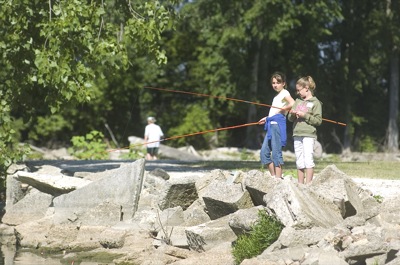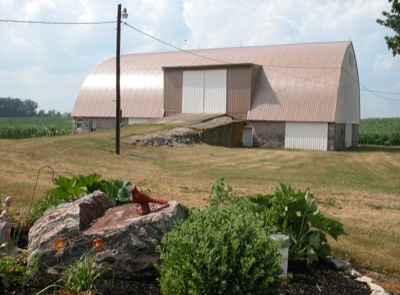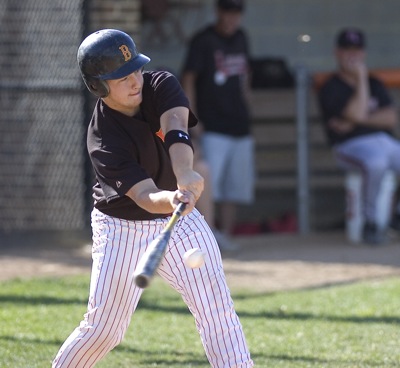Friday, July 13th, 2007
Where are all of the fish?
By Bobby Pierce

Photo by Mark Pummell/The Daily Standard
Kalie Tobin, left, and Anne Hertenstein fish in Grand Lake during the 2007 conservation camp held this morning at the Harbor Point 4-H campground near Celina. The annual event is sponsored by the Grand Lake/Wabash Watershed Alliance and teaches youths the importance of conservation through fun exercises. Thirty-four children registered this year.
Art Wise is steaming mad. He has been fishing Grand Lake for the better part of a century and claims the fishing has never been worse.
Now he is turning to the state for answers.
"You just can't go out and catch fish anymore," said Wise, 62, who owns property on West Bank Road and lives in Lawrenceburg, Ind.
He said 10 to 15 years ago there was always somewhere along the lake to catch fish - but not anymore.
Wise has been coming to the lake since he was 5 for family vacations. When he was in his 30s with a family of his own, he returned to the lake to vacation and fish.
Doug Maloney, the fish management supervisor for the Ohio Department of Natural Resources Wildlife Division, said, "He is right on. The lake over the last four years is on a down cycle for crappie."
Crappie, Wise's fish of choice, has fallen on hard times in Grand Lake. According to a state survey, it takes 10 to 12 times longer to catch a crappie today than it did in 1987.
Compare this to the time it takes to catch a bass, which has stayed the same, or a catfish, which is twice as easy today.
Maloney blames only mother nature for much of this. Everything from cold weather during their hatch to bass eating the crappie fry could be an explanation, he said. One bad year can start a downward cycle, he said.
As far as a solution goes, there won't be change anytime soon.
"Unfortunately for crappie anglers, I don't see a magic bullet to guarantee a great crappie hatch next year," he said.
Wise doesn't like that answer.
"That is so generic," Wise said. "Why don't they bring in an outside agency?"
Wise said in the last few years the only thing to change in the lake was increased walleye fry and fingerlings, placed there by the state. And that is why Wise would like to see a private expert come to the lake, citing that the state won't publish a study saying they hurt crappie fishing.
Wise also said pollution is not the problem, because fishing was great in the 50s and the water was just as polluted.
Maloney agrees that the water isn't the main problem, this time at least.
"In my best professional opinion, I couldn't make that claim. Crappie populations can fluctuate drastically, having nothing to do with water quality," he said.
But that isn't to say that better water isn't his goal. Maloney claims that the surest way to long-term good fishing is to maintain good water by reducing eroded soil and nutrients that make their way into the water.
State legislators already have proposed a bill that they think could help the lake. House Bill 235 is supported by Ohio Game Fishers and Environment Ohio for this reason. It would require all discharges of sewage and partially treated sewage into waterways and on land in the watershed to be reported to various media outlets and government officials. That way people could know where not to fish.
It would also, in theory, decrease the amount of such discharges, which would in turn decrease the amount of nutrients in the lake. The nutrients cause the growth of algae, robbing the water of oxygen needed for fish to survive.
The bill currently is in committee where local Rep. Jim Zehringer is the vice chair. He said notification of sewage discharge is a step in the right direction, but it isn't enough. He advocates increased funding to small communities and villages to fund their own sewer systems, rather than focusing on combined sewer systems.
Wise won't be satisfied with the state's findings until there is some independent research done, he said. The death of fishing in the lake started about 10 years ago, he said, and he won't be happy until it is fixed.


